Institutional Context
Summary
Established for over 125 years, and part of the University of London, Goldsmiths spans the arts, humanities, social sciences, cultural studies, computing, business & management, and law. It is also a provider of professional training in teaching, social work, counselling, and therapy practice. Knowledge creation and exchange – from curiosity-driven research to work that applies its research to real-world issues – underpins its intellectual, creative, and social culture.
As a campus-based university in the London Borough of Lewisham, an area of significant deprivation, as well as being racially diverse, its local economic, cultural and social impacts are highly significant, and Goldsmiths recognises that these impacts will become even more important for its local community in the future.
Institutional context
Goldsmiths has four thematic priorities for its research and knowledge exchange endeavour:
creative economy, culture and technology
environmental sustainability and responses to the climate crisis
health and wellbeing
inequalities and social justice
These priorities reflect Goldsmiths’ research strengths and commitments, as well as the priorities and needs of its stakeholders (see stakeholder map). Its research takes a strong social and humanistic approach to the challenges facing society. Goldsmiths’ research and creativity also help to develop new ideas, technologies and services, including contributions to the UK’s creative, digital and AI industries.
In recognition of the importance of these sectors for local economic growth and jobs and the diverse population locally, Goldsmiths has grown its business support and skills programmes, to support SMEs in the creative and digital sectors, with a focus on those led by female or Black entrepreneurs. These programmes are typically co-designed with local stakeholders (notably Lewisham Council and the Greater London Authority).
Goldsmiths informed the development of Creative Enterprise Zones (a mayoral initiative to support creative sector start-ups, grow new jobs and help local people develop their skills and the Greater London Authority’s flagship programme for growth in the creative sector), including the CEZ within our locality of New Cross and Deptford. The CEZ Action Plan described Goldsmiths as “our key creative engine – and a vital driver of London’s creative economy. It provides much of our talent, has shaped the district’s creative identity for several generations, and it has pioneered new ways of working that are transforming the very ways we operate as cultural beings.”
Goldsmiths makes direct contributions to cultural life and influences cultural and artistic practice, with its research reaching the public through exhibitions at museums and galleries as well as broadcast media. Goldsmiths and its Centre for Contemporary Art (CCA) played a significant role in helping to deliver Lewisham’s London Borough of Culture award in 2022, including a programme of community outreach and public engagement, and will support the development of a sustainable cultural strategy for Lewisham.
Goldsmiths supports students to start their own business or become self-employed. For example, the SYNAPSE programme has provided innovative entrepreneurial training to some 5,500 students since the programme started in 2010, as well as coaching and support for graduate and student incubators. Goldsmiths was ranked 6th out of 121 universities on the number of students starting their businesses, with nearly 15% of Goldsmiths’ students going on to start or run a business.
As part of the development of its new ten-year strategy – Goldsmiths 2033 - Goldsmiths intends to build on all these foundations. A new Research and Knowledge Exchange Strategy will underpin the new institutional strategy, with the aim of enabling excellent research and knowledge exchange to have a sustainable future at Goldsmiths, focused on:
developing excellent and impactful research, new knowledge and innovation through collaboration and co-production with partners
providing expertise and solutions to industry, business, policymakers, and communities
enhancing our contributions to cultural, social and economic well-being
identifying opportunities for students to engage in these activities.
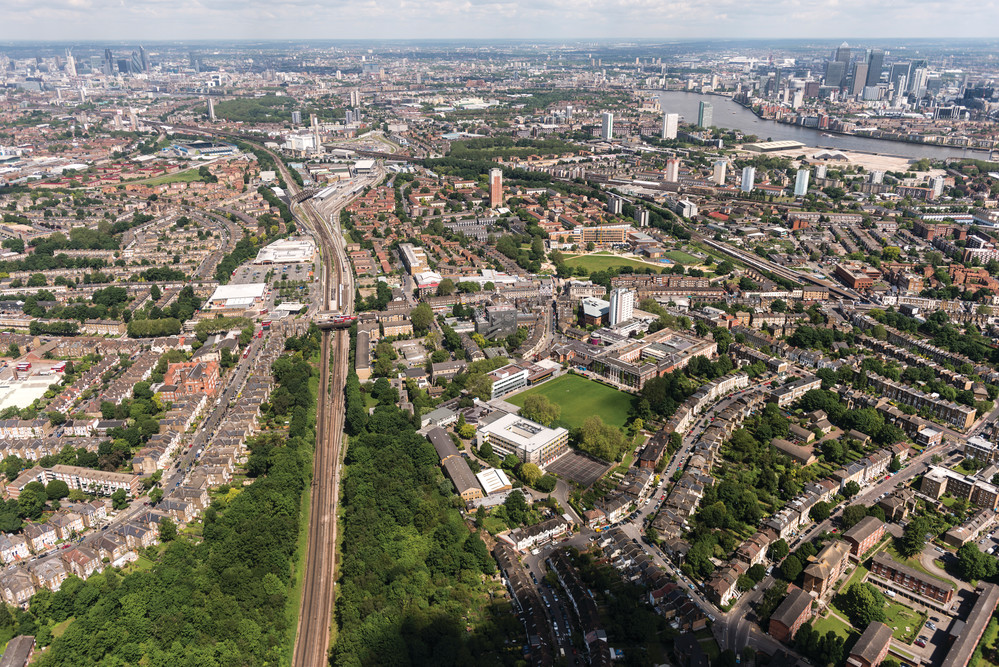
For further information, please send queries to t.steer@gold.ac.uk
Local Growth and Regeneration
Summary of approach
Our approach is rooted in the needs of our locality, with a focus on collaboration and co-production. Through meaningful relationships with local stakeholders, we have honed a portfolio of business support, skills development, and engagement with infrastructural regeneration, combining academic expertise, student resource, project management and funding to improve skills, knowledge and outcomes for businesses and residents.
We take pride in our location: the gateway to Southeast London, the westernmost anchor of the Thames Estuary Production Corridor, and the epicentre of a hub for creative and cultural production. We are committed to removing systemic and cultural barriers that inhibit underrepresented business owners and individuals from achieving their potential, and ensuring grassroots voices are heard in the context of local development.
Aspect 1: Strategy
Making a difference through research and knowledge exchange is one of Goldsmiths’ strategic priorities (Institutional Strategy 2018-23). Later this year (2023), a refreshed institutional strategy to 2033 will place an even greater emphasis on impactful research and KE. Our strategic approach is woven through our Civic Strategy, Civic University Agreement (CUA), and HEIF strategy, and will be reaffirmed in a new RKE strategy.
Goldsmiths’ strategic approach reflects our location and academic expertise. Lewisham borough is a creative hub, home to a significant population of creative businesses and micro-SMEs, with few medium or large businesses. It faces significant economic challenges; one of the most deprived boroughs, with the worst job-to-resident ratio in the whole UK. Our approach has therefore largely focussed on supporting growth and job creation in small businesses.
Thanks to a deep-rooted partnership with Lewisham Council, our Local Authority (LA), academic expertise and student resource have been deployed to support businesses and address skills gaps. We act as a representative for workers and residents in relation to regeneration and development activity, and we work with our neighbouring LAs, the Greater London Authority and the London Economic Action Partnership to feed into the wider region.
Our HEIF strategy outlines our strategic objectives across the KE portfolio:
OBJECTIVE 1 – ECONOMIC GROWTH, JOBS AND PROSPERITY
Fostering local growth
Supporting SMEs
Supporting student enterprise
OBJECTIVE 2 – CREATIVITY, IDEAS AND INNOVATION
Research Themes
Increasing spin-outs and KTPs
Facilitating academic engagement
OBJECTIVE 3: SKILLS
Flexible learning opportunities
Strengthening partnerships
Higher-level skills programmes
These objectives can be summarised in the context of our strategic approach to LG&R:
Business support
Skills development
Engaging in local infrastructural regeneration projects
This activity is provided under the umbrella of the NX Hub. Originally envisaged as a workspace, this is now a broader portfolio of activity supporting small businesses and residents, delivered by staff in Research & Knowledge Exchange (RKE) with strategic direction from the Academic Lead for Enterprise.
As part of Goldsmiths’ strategic refresh, a revised NX Hub strategy will outline our aims and approach, including funded business support and skills programmes, network/membership, bilateral engagement between academic researchers & businesses, and bespoke support for underrepresented business owners.
Increasing our capacity to deliver impactful local growth & regeneration activity is a significant strategic priority. We will continue to invest staff resource (academic and administrative) in this area, and work with partners to leverage funding for delivery. We will continue to engage with LAs to identify opportunities to deliver support on a pan-London and sub-regional level (such as the UK Shared Prosperity Fund, replacing European funding).
Our local area
Place is of the utmost importance to our strategic approach. Goldsmiths holds local significance, with an education establishment ever-present on our site since the 1790s. New Cross embodies London’s juxtaposition: as one of the poorest parts of an undeniably wealthy city, our residents and businesses are often left behind. Lewisham has historically been a residential borough; hence its business ecosystem is young and heavily weighted to small and micro businesses.
This table outlines our local area, represented visually below (Figure 1).
1. Hyperlocal |
||
|---|---|---|
| Area | Description | Strategic priorities & need |
| Evelyn, New Cross and Brockley Wards | Goldsmiths sits across Brockley and New Cross wards, with Evelyn our neighbour to the north | We act as a representative for businesses and residents. We have curated regeneration activity in the form of public art (visual and performance), and work with schools, businesses and other organisations. |
| New Cross and Deptford | New Cross and Deptford are two of Lewisham's high streets, together one of London's GLA-funded Creative Enterprise Zones (CEZs) | We are a strategic and delivery partner in the CEZ. Need has been identified collaboratively, through the Council’s strategic and operational plans and research carried out by Goldsmiths. Business support programmes incorporate diagnostics and surveys which help identify recurring themes in terms of the support required. |
2. Local |
||
| London Borough of Lewisham | One of London’s 32 local authorities, the borough is made up of 19 electoral wards and incorporates three parliamentary constituencies. Diverse, multicultural and a heavily residential borough, Lewisham is home to just over 300,000 residents. |
We work with the LA to support business engagement and skills development across sectors, with a particular focus on the Creative and Digital Industries (CDI). Goldsmiths worked with 11 Anchor Institutions in the borough to identify an Action Plan outlined in the CUA, developed with significant public and strategic consultation, including local businesses. Lewisham Council has identified investment in CDI as a strategic priority, capitalising on the cultural landscape in which Goldsmiths plays a key role. Need is also identified through evaluation surveys during and after business support programmes. |
| Stride | Wandsworth, Lambeth, Southwark and Lewisham. | Stride supports creative industries businesses and breaks down cross-borough borders. |
| Southeast London | Lewisham, Greenwich, Bexley, Bromley | We aim to grow our reach across Southeast London, building on existing success and our understanding of local need, and combining this with priorities identified by respective LAs and stakeholders. |
3. Regional |
||
| Thames Estuary Production Corridor | Creating a world-class centre for creative and cultural production across 7 London boroughs, Essex and Kent. | Goldsmiths is a partner and the westernmost cultural anchor of the corridor south of the Thames. |
| Greater London | The 32 boroughs of Greater London and City of London. | We deliver GLA-funded and/or managed regional programmes (historically ESIF, now UKSPF). The GLA manages London’s Local Enterprise Partnership, with which we are engaged. |
4. National and International |
||
| The UK and worldwide | In a national and international context our priorities centre around Creativity and Culture, public & third-sector organisations and social enterprises. Our short courses and worldwide programmes have national and international reach, and we support international start-ups through the Start-up Visa and work with the British Council. | |
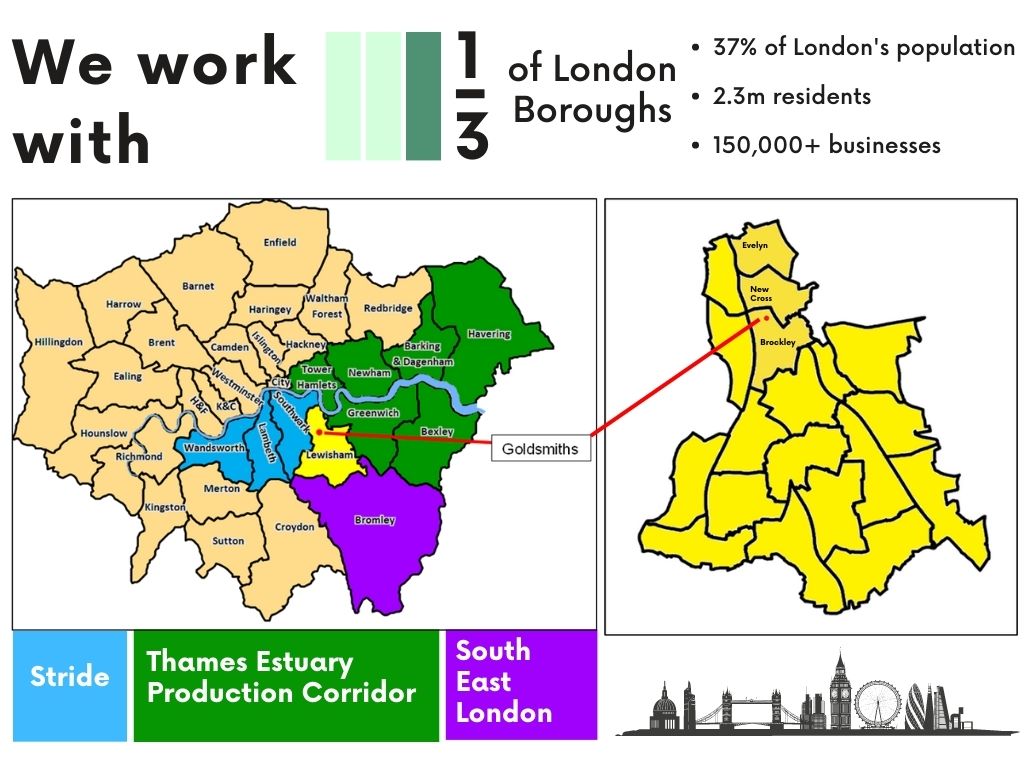
Aspect 2: Activity
The last 3 years saw huge growth in Goldsmiths’ Local Growth & Regeneration (LG&R) activity, reflecting a convergence of:
Aligned strategy and approach
Ever-increasing need in the face of economic hardship
Place-based initiatives in which we are a partner.
Our model for delivering business support combines a bespoke package of activity including a dedicated Business Adviser in the RKE department, Goldsmiths’ academic staff and student resource and a diverse network of external providers. Meanwhile, we have worked to apply our expertise in creative and cultural education to support upskilling and reskilling of individuals towards employment and education outputs:
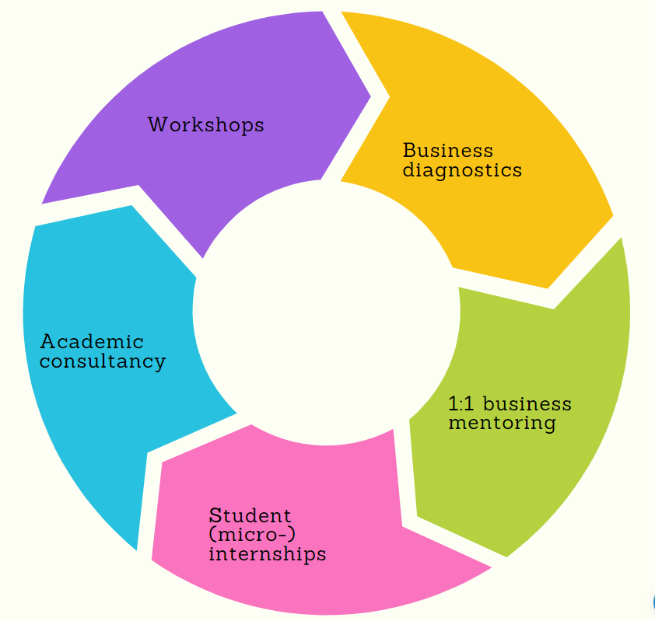
Figure 2 - Circular Flow diagram showing the model for delivering business support
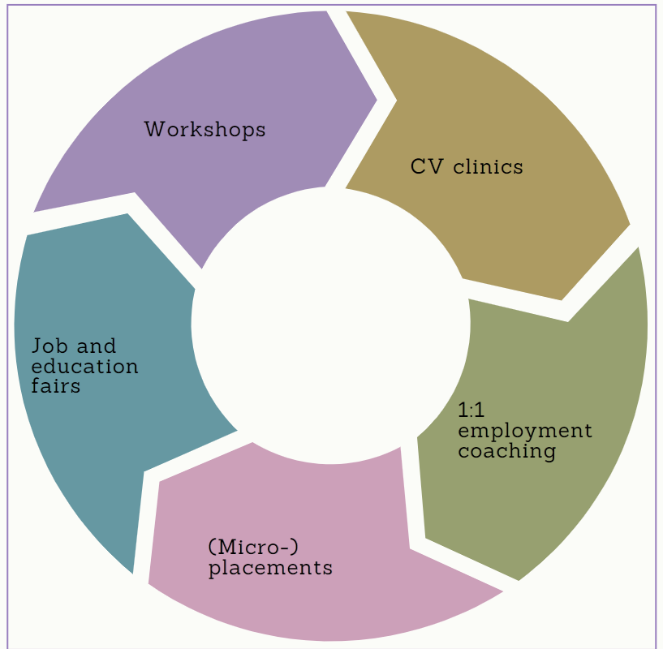
Figure 3 - Circular Flow diagram showing the approach to upskilling and reskilling individuals towards employment and education outputs.
Programmes are led by the Business Engagement team (RKE department) with support from the Academic Leads. Activity has focussed on academic expertise in ICCE, IMS, Computing, MCCS, and Design.
Data demonstrates this growth and improved efficiency in terms of staff resource:
| Metric | 2019-20 | 2020-21 | 2021-22 |
|---|---|---|---|
| Income from LG&R activity | £80k | £190k | £356k |
| FTE of HEIF-funded staff delivering activity | 2.1 | 2.9 | 3.8 |
| Businesses supported (estimated) | 250 | 350 | 600 |
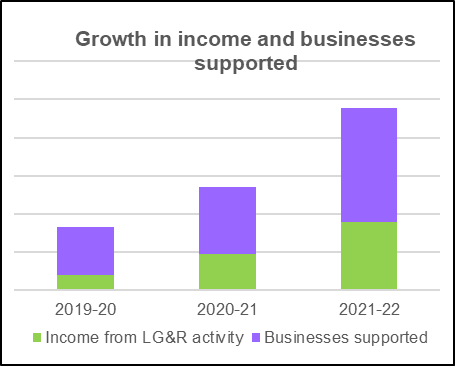
Figure 4 - Bar chart showing growth in income and businesses supported.
>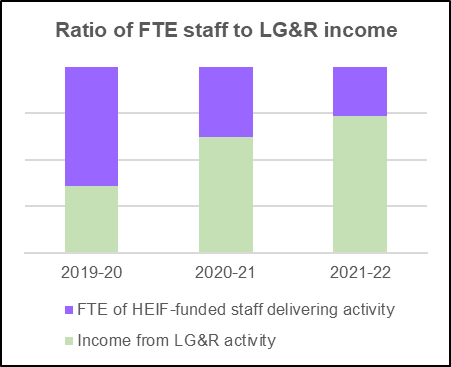
Figure 5 - Bar chart showing ratio of FTE staff to LG&R Income
Key activities
The table highlights key activity we have delivered during the reporting period, with Figure 6 below mapping these to our local area per Section 1. Figures 7 & 8 pin businesses engaged in these programmes, demonstrating the breadth and depth of our reach.
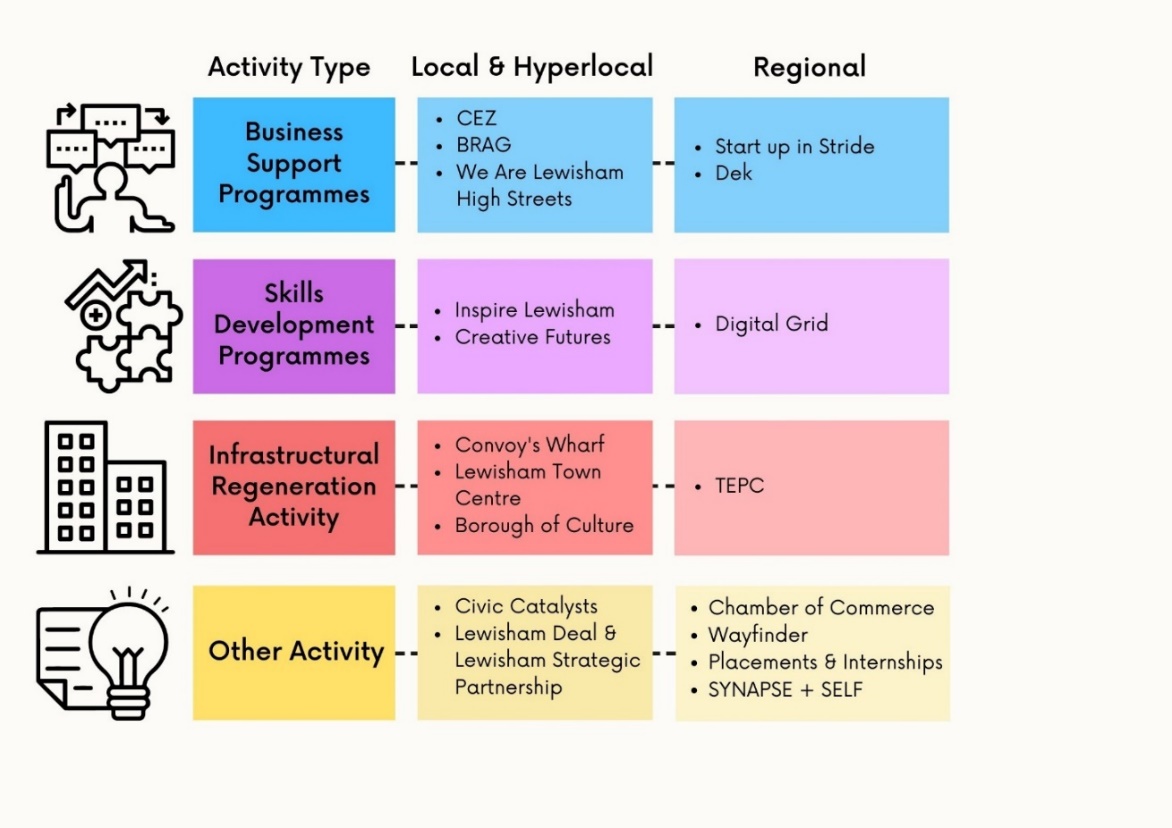
Figure 6 - Activity mapped to local area
| Funded Business Support and Skills programmes | |||||||||
|---|---|---|---|---|---|---|---|---|---|
| Activity (dates) |
Description | Project value (& funder) |
Partners | Evaluation / meeting need | |||||
Dek Business Growth Programme (2018-2020) |
ERDF-funded programme supporting SMEs in London to grow. | Overall: £500k (ERDF) Goldsmiths: £250k |
LB Lewisham, LSBU, NWES | External evaluation (Amion) | |||||
Digital Grid Partnership (2019-2021) |
A project addressing skills gaps and informing curriculum development, working with at London-based SMEs with creative and tech needs. | Overall: £1.2m (ESF) Goldsmiths: £100k |
Colleges (Newham; Richmond Upon Thames; Barnet & Southgate); Universities (Loughborough; UAL; LSBU) | Self-evaluation (Newham College) | |||||
New Cross & Deptford CEZ (2019-present) |
Goldsmiths is a strategic partner and steering group member of SHAPESLewisham, one of six funded CEZs. Goldsmiths received specific funding to support creative businesses. | Overall: £1m (GLA) Goldsmiths: £25k |
LB Lewisham, LEAN, The Albany, Second Floor, Studio Raw, Cockpit, Trinity Laban | End of programme evaluation (Goldsmiths) | |||||
Start-up in Stride (2021-22) |
Goldsmiths is a strategic partner in Stride, a Lambeth Council programme (City of London-funded) supporting creative businesses in South London. Goldsmiths ran Start-up in Stride, supporting 32 entrepreneurs/start-ups. | Overall: £8m (CoLC) Goldsmiths: £110k |
LBs Wandsworth, Southwark, Lewisham, Lambeth; multiple delivery partners | Evaluation underway at time of writing | |||||
Inspire Lewisham (2021-23) |
Inspire Lewisham is one of the last EU-funded projects in the UK, supporting economically inactive Lewisham residents into the creative industries, and supporting employers to form placements and jobs. | £500k (ESF and LB Lewisham) | Lewisham College, The Albany | Needs assessed through a Bespoke Training Plan. | |||||
Lewisham Business Resilience & Growth Programme (BRAG) (2022) |
This programme supported Lewisham-based businesses (particularly underrepresented businesses) to help them recover from the impact of COVID-19. | £100k (ARG) | - | End of programme evaluation, survey of businesses | |||||
We Are Lewisham High Streets (2022) |
This programme helped independent high street businesses to engage with Lewisham’s year as Borough of Culture, to benefit from increased footfall and awareness. Businesses (particularly hard-to-reach businesses) were able to get involved in We Are Lewisham, and received funding to organise cultural projects. | £50k (ARG) | - | ||||||
| Lewisham Creative Futures (2022) | As part of Lewisham’s Creative Futures programme, we delivered:
|
Overall: £500k (UK CRF and PHF) Goldsmiths: £116k |
LB Lewisham, The Albany, Entelechy Arts | External evaluation (Art of Regeneration) | |||||
| Non-funded and Other activity | |||||||||
| Activity | Description | ||||||||
|
|||||||||
| Regeneration of Convoys Wharf | A major development to build 3,500 new homes in the northernmost part of Lewisham, adjacent to the Thames. Goldsmiths is on the community forum, helping to ensure voices of the university and the community are heard | ||||||||
| Regeneration of Lewisham Town Centre | Goldsmiths is engaged in Lewisham’s Town Centre Partnership, feeding into plans for the redevelopment of Lewisham Town Centre, including £19m of government Levelling Up funding. Lewisham Shopping Centre is to be redeveloped, and Goldsmiths is delivering community engagement activity as part of this | ||||||||
| Thames Estuary Production Corridor | Goldsmiths is a strategic partner in the TEPC (see aspect 1) | ||||||||
| Borough of Culture 2022 | Goldsmiths was a key partner in Lewisham’s year as Borough of Culture (see Public & Community statement as well as above activity) | ||||||||
| Lewisham Strategic Partnership and Deal | Goldsmiths is a member of the Lewisham Partnership, which has subsumed the Lewisham Deal and Lewisham Backs Business (see Civic University Agreement). | ||||||||
| Local initiatives we have supported |
|
||||||||
|
|||||||||
| Civic Catalysts | Facilitates KE opportunities between Goldsmiths academics and local organisations, with a view to these leading to further KE activity down the line. (See Public & Community statement). | ||||||||
| Employer engagement (Careers dept.) | Works with a variety of employers to identify placement and internship opportunities for students, which provide business support and capacity building among. Currently, almost 1,600 businesses are registered on the employer engagement database. | ||||||||
| SYNAPSE | A programme of entrepreneurship support delivered for Goldsmiths students and external businesses, including the Sustainable Enterprise London Festival (SELF). Much of Goldsmiths’ business support approach is informed by SYNAPSE, led by academics in ICCE. | ||||||||
| Research activity | Research on local business, skills and regeneration includes:
|
||||||||
| Goldsmiths as an employer and procurer |
|
||||||||
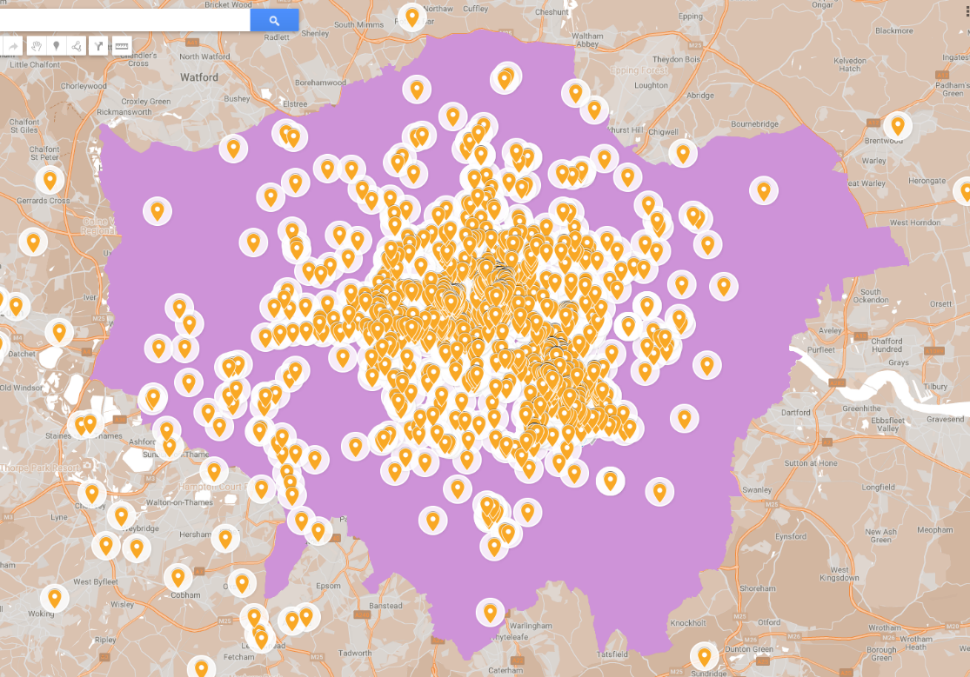
Figure 7 - businesses in London that Goldsmiths works with.
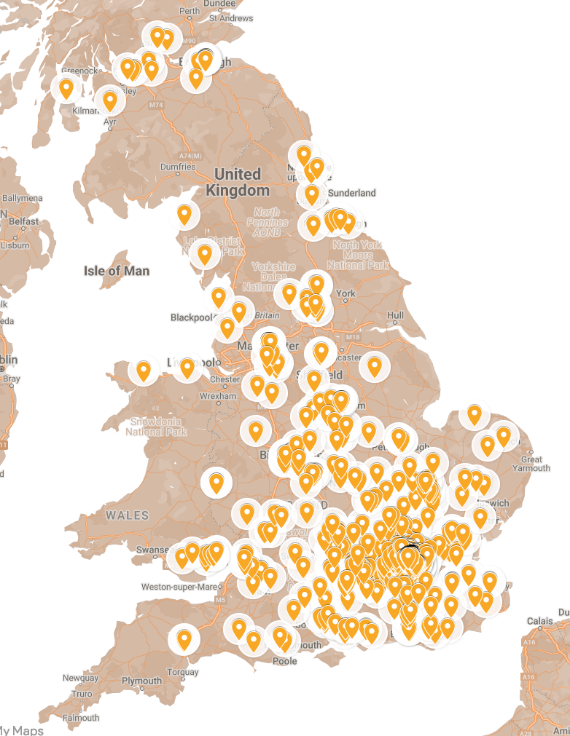
Figure 8 - businesses in the UK that Goldsmiths works with.
Aspect 3: Results
Results of funded programmes
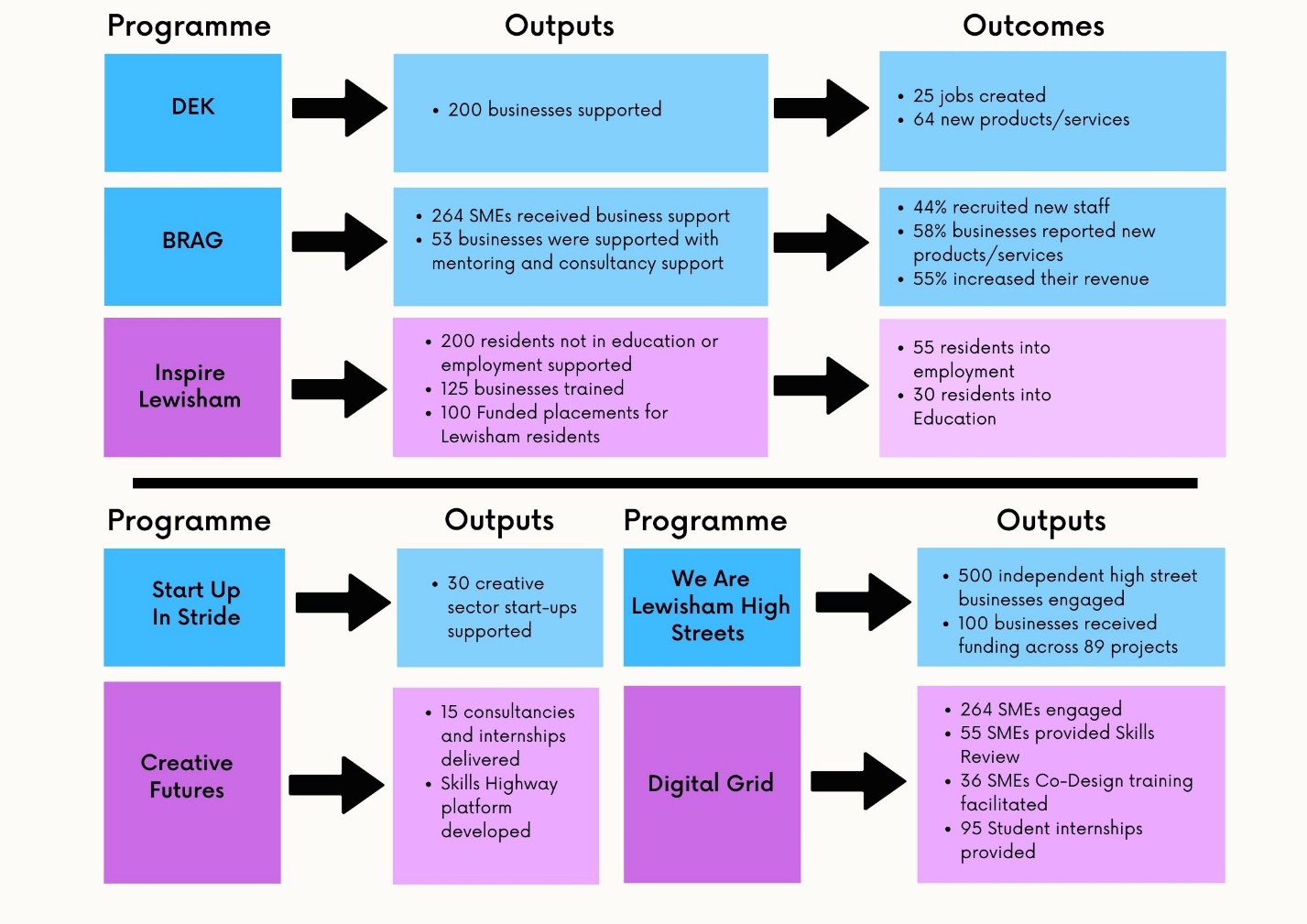
Wider impact
Hard-to-reach businesses and residents
Our support has directly resulted in improved engagement with hard-to-reach and underrepresented businesses in our locality. The need for this became apparent through the pandemic, given the economic and demographic context.
Our distinctive approach to engaging businesses meant that we engaged hundreds of businesses who had not previously engaged with Goldsmiths or Local Authorities. We helped businesses to apply for and receive grant funding, including many who had not benefited from previous Covid-related funding. We worked proactively with the Council, DWP and other stakeholders to ensure eligible participants were onboarded to Inspire Lewisham and supported into education and employment.
Business and cultural eco-system
Our activity helped create a more joined-up and economically stable business ecosystem in our locality. We helped facilitate virtual and in-person networking for businesses, hosted Meet the Buyer events to increase SMEs’ capacity to enter the public sector supply chain, and improved businesses’ resilience and growth. This was important given the economic context of the pandemic and cost-of-living crisis, and the exacerbated hardship for diverse communities.
We supported creative businesses, with particular achievements including new Arts Council National Portfolio Organisations, national recognition for cultural establishments, and a successful year as London Borough of Culture. We helped independent high street businesses and neighbouring cultural anchors engage with one another for mutual benefit.
Our work has raised awareness for local independent businesses within the Goldsmiths community, for example through increased staff and student discounts and a business noticeboard.
We have developed meaningful relationships with hundreds of local businesses, and greatly expanded business databases to ensure ongoing collaboration and support.
National recognition
Having been awarded one of London’s six CEZs, Lewisham has since been awarded Borough of Culture 2022, won two awards at the Federation of Small Business’ Local Government Awards, secured £19m of Levelling Up Funding, and had a case study published as part of the Local Government Association’s commission on Culture and Local Government.
Impact and Knowledge Exchange
Forming part of Goldsmiths’ portfolio of impactful research and Knowledge Exchange activity, these projects have helped to ensure that local businesses and residents benefit from the research expertise across the College, and vice versa. There were manifold benefits for Goldsmiths students, particularly internship and consultancy opportunities.
Communicating and acting on results
The scale of support delivered in the last three years has allowed us to refine our approach to delivery. Following consultation with beneficiaries and other stakeholders, we have developed an effective model, and look to grow and replicate this approach.
Results have been communicated through published evaluations, case studies and news stories, both on our platforms and those of our partners:
We are working to continue and grow our local support, drawing on successes and feedback from past activity. The next 3 years will see a period of significant regeneration and development activity in which Goldsmiths will play a key role, in Lewisham and our wider area.
Public & Community Engagement
Summary of approach
Our approach to public and community engagement is rooted in a cross-university model. Our aim is to embed a culture of engagement across Goldsmiths, from engagement with our research and teaching through to engagement with our staff, students and estate. Through an ongoing programme of training, funding schemes and initiatives run in partnership with external organisations we work to deliver on commitments made in our Civic Strategy, Civic University Agreement and Public Engagement with Research Strategy. Our approach is rooted in close and continuous dialogue with our surrounding communities in New Cross, Lewisham and London. Our partners in the community help us design our strategies and programmes of work and hold us to account against key commitments.
Aspect 1: Strategy
Our approach to public and community engagement reflects the unique research and teaching culture of Goldsmiths alongside its location in New Cross, Lewisham. As a one-campus university with a significant local footprint, we are guided by engagement with the communities and cultures of our locale. Our aim is to embed public and community engagement across the university, from co-produced research, two-way engagement with our research and practice, staff and student volunteering and community use of our cultural facilities and estate.
Engagement activity is embedded across the College and guided by our Civic Strategy, Civic University Agreement, and Public Engagement. Logic models, following a ‘theory of change’ template, can be accessed for each of these strategies here.
Our Civic Strategy and Civic University Agreement (CUA) were approved by Council in 2021 after extensive consultation with our local communities, with stakeholder organisations, and within the university. Our CUA was co-developed and co-signed with 11 other anchor institutions within Lewisham, including Lewisham Council and Lewisham & Greenwich NHS Trust. It commits us to working in partnership on shared priorities including educational attainment, jobs and skills, culture, health & wellbeing, and environmental sustainability. We were the first London-based university to launch a CUA, and among the first nationally.
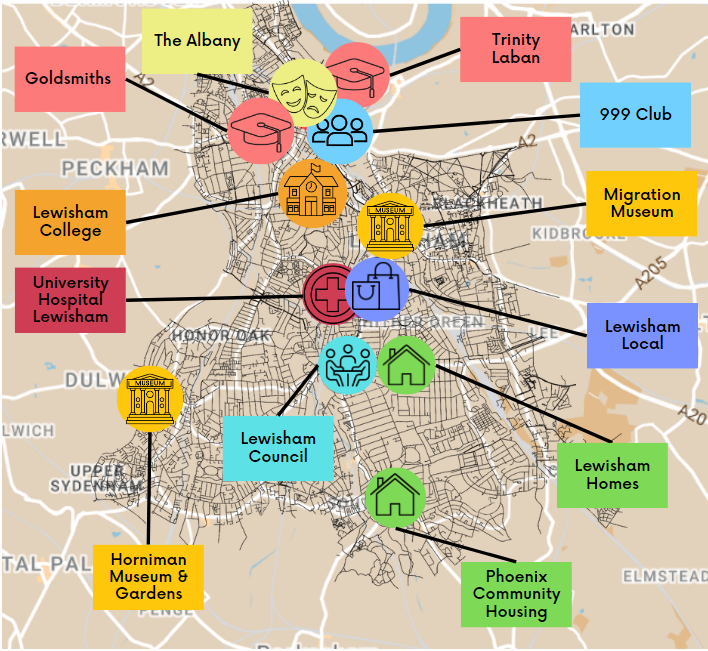
Figure 1 - Map of Lewisham showing each CUA partner.
Our Public Engagement Strategy (focussing on public engagement with research (PER)) commits us to high-quality two-way Public Engagement with research, with a focus on connecting meaningfully with our local communities. PER activity draws on the particular research/ practice expertise of Goldsmiths, with a focus on creativity, innovation and interdisciplinarity as well as on social justice.
Our PER Strategy was developed in 2018 and informed by responses to a survey of all Goldsmiths researchers. In 2023, as part of Goldsmiths’ work to develop both its new ten-year institutional strategy (2023-2033) and new Research and Knowledge Exchange Strategy, a similar exercise will be undertaken, involving community dialogue and consultation. This will also offer opportunities to align with UKRI’s Research and Innovation for all strategy for public engagement (2022).
Delivery of the CUA and Civic Strategy is overseen by two leadership-level groups: the Goldsmiths Civic Strategy Group (internal) and Civic University Partner Group (external). They are chaired by our Pro-Warden for Research, Enterprise & Knowledge Exchange (Civic Strategy Group) and Director of Research, Innovation and Knowledge Exchange (CUA).
Public Engagement with Research is overseen by a Public Engagement Strategy Group (PESG), chaired by the Academic Lead for Public Engagement. It meets three times a year to review progress towards strategic aims. A termly cross-university ‘Civic & Community Engagement’ forum also provides opportunities for aligning the work of different teams and departments, and is attended by Departmental Public Engagement Reps.
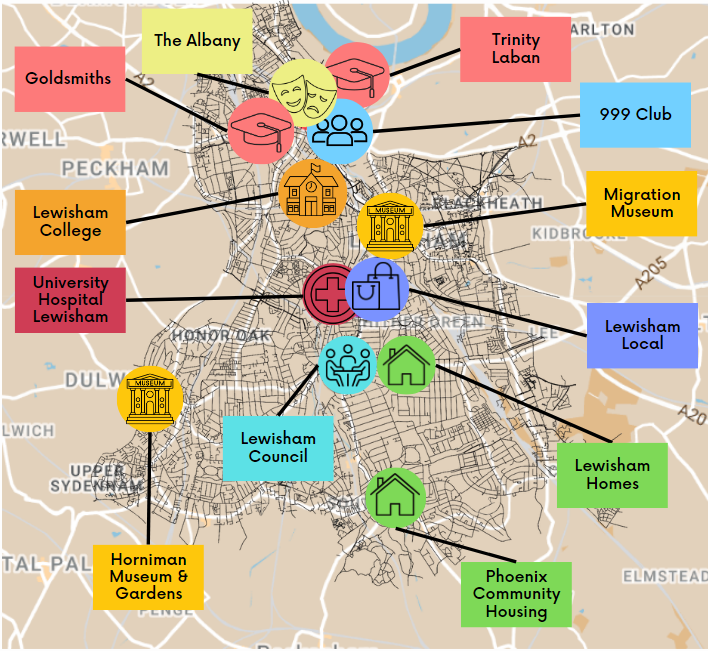
Figure 2 - Civic Governance Structure: Goldsmiths Civic Strategy Group, CUA Partner Group, Civic & Community Engagement Forum, Public Engagement Strategy Group
Resources for civic and public engagement are embedded across the College as a whole, involving all academic departments and activities spanning teaching, research and KE and the Student Union. Hundreds of staff and students volunteer locally and the College also provides resource in terms of access to its Library, free or discounted room hire, and outreach programmes led by staff in Goldsmiths Centre for Contemporary Art (CCA).
Beyond this embedded resource, a central budget of around £30,000 supports public and community engagement activity (drawn from QR and HEIF). This supports internal funding schemes, our Warden’s Awards, and other core activities and is supplemented by external funding for strategic projects. Value for money is assessed both in terms of depth and reach and is factored into our reporting and evaluation.
EDI is built into our work on a number of levels. Our Civic Strategy commits us to supporting, engaging with and learning from the diverse communities of Lewisham, one of the most multicultural areas of London. Our CUA partnership supports this, bringing us into closer alignment with Lewisham Council’s race equality work and status as a ‘Borough of Sanctuary’. Within Goldsmiths, we work in dialogue with the Race Justice Strategy (2023) and EDI team. Engagement with local partners including the Migration Museum, Lewisham Refugee and Migrant Network, New Cross Fire Foundation and IRE! Dance also helps us to work meaningfully with diverse communities.
A key strategic move since 2019 has been the theming of engagement work and grant calls. This has allowed us to align seed funding with key local, EDI and social justice issues. In 2021, for example, all Public Engagement Grants were tied to projects marking the 40th anniversaries of the New Cross Fire and Black People’s Day of Action, key Lewisham events that are also pivotal moments in Black British History.
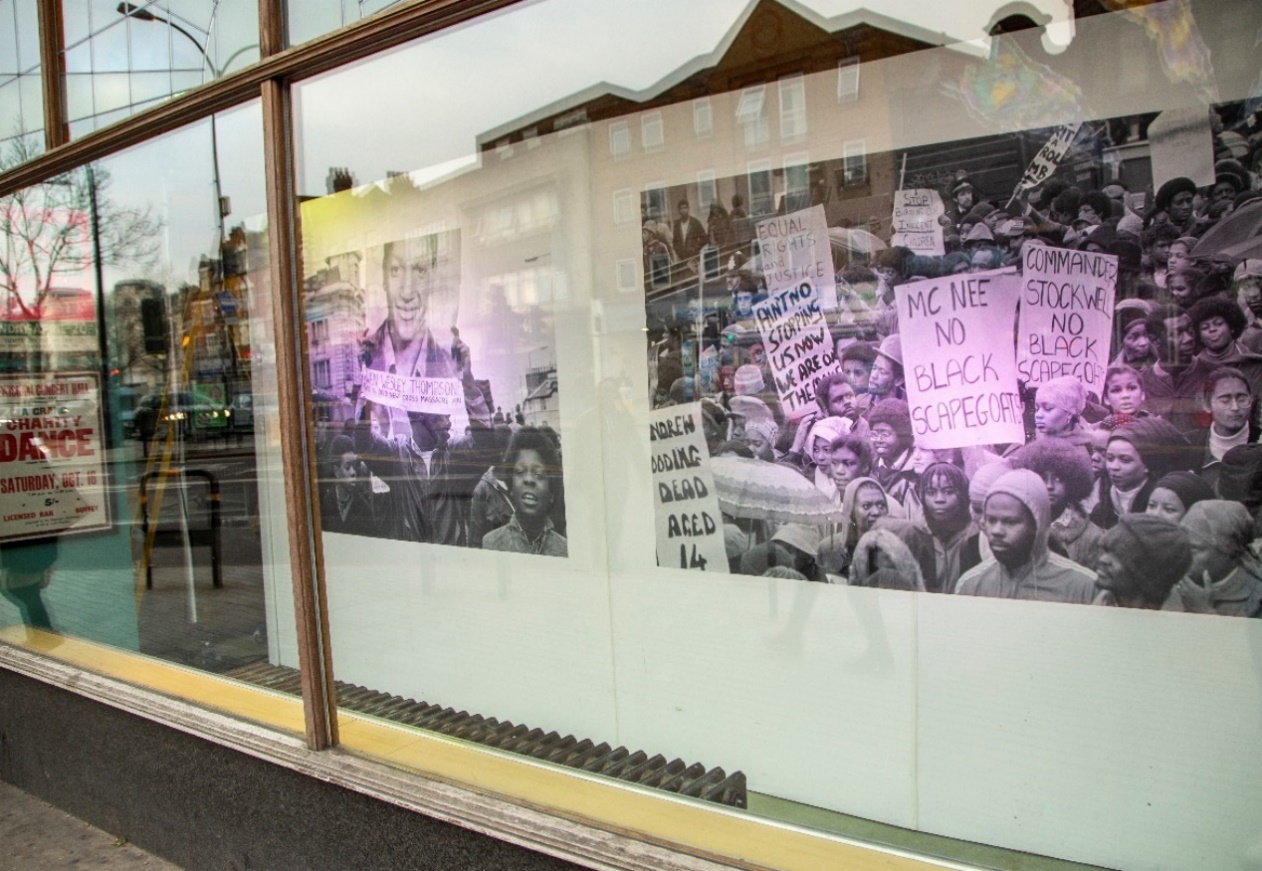
Figure 3 - Pop up exhibition at Catford Broadway commemorating the Black Peoples' Day of Action 1981
Aspect 2: Support
We have taken an embedded, infrastructural approach to supporting public and community engagement at Goldsmiths. The university has invested in central staff and provided resource for internal funding schemes and training opportunities. A number of governance, evaluation and reporting structures have been put in place and a network of external partnerships helps to support and guide our work.
A core ‘Civic and Public Engagement’ team, based within Research and Knowledge Exchange, supports and helps to corral engagement activity across the university. This team comprises:
Head of Civic Engagement (FT)
Public Engagement Manager (FT)
Engagement Assistant (0.6)
Strategic direction is also provided by an Academic Lead for Public Engagement, by our Pro-Warden for Research, Enterprise and Knowledge Exchange and by our Director of Research, Innovation and Knowledge Exchange.
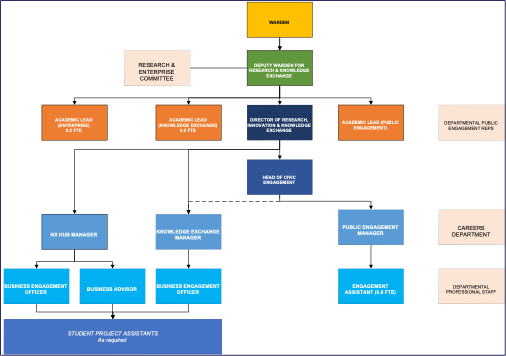
The core engagement team works closely with other staff (professional and academic) across the university. This includes in areas such as Widening Participation, EDI, and Student Volunteering. Some Departments also have their own embedded engagement professionals, such as an ‘Engagement Producer’ based at our Centre for Contemporary Art (CCA).
A suite of resources has been developed for Goldsmiths researchers (available on our staff intranet) to help guide them in developing engagement activities. These include practical guides to developing events, working with community partners and evaluation. Resources are accompanied by a training programme and by 1-to-1 support given to researchers, including those developing funding bids related to public engagement.
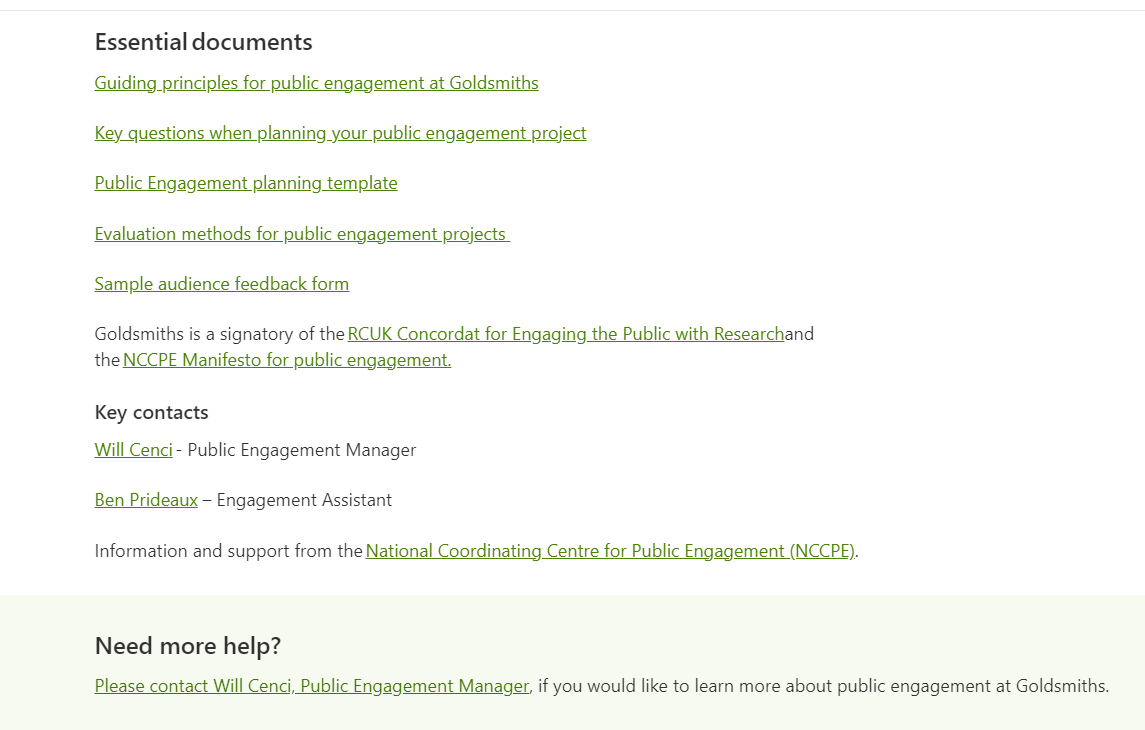
Figure 5 - Screenshot of Public Engagement resources available on Goldsmiths intranet
A number of regular internal funding schemes provide seed-corn funding for engagement activities. These include:
Civic Catalyst Grants (up to £4,000) – focused on aligning Goldsmiths research with community need via participatory research projects.
Public Engagement Grants (up to £1,500) – focussed on supporting high-quality two-way public engagement with research via events and activities.
Engagement with local festivals and community events provides delivery opportunities for projects funded by these schemes and helps us to stay visible in our local community. We also run regular 'Community Conversation’ events, consultations and town hall meetings. A recent example, with an EDI focus, was a large-scale community consultation exercise around colonial-era statues on our Deptford Town Hall building (c. 5,000 engagements).
Our annual Warden’s Annual Public Engagement Awards (offering prizes of £500) provides an important reward and recognition mechanism for celebrating public engagement activities by staff. Having taken a break in 2021 and 2022 the awards are due to return in an expanded form in 2023.
Co-production and co-creation are central to our approach and our philosophy. All projects funded by internal grant schemes are required to feature elements of co-production and our 2022 programme for Lewisham Borough of Culture (outlined below), for example, was entirely co-created with community groups.
Aspect 3: Activity
Goldsmiths has a number of regular public and community engagement programmes in place. These span widening participation and youth work, business engagement, programmes geared towards creating deeper engagement with Goldsmiths research, staff and student volunteering initiatives and programmes offering access to our campus-based resources and estate.
Core community engagement programmes include:
Community Library Membership – Passes for local readers allow access to the Goldsmiths’ Library. 291 passes approved in year 2021-22.
Community Room Hire – We offer free rooms to local charities and community organisations. In 2021-2022, the total value of the free space offered was £44,895.00 (25 hires).
Civic Days – A new Staff Volunteering Policy to allow all staff to take 3 paid days a year to volunteer locally.
Widening Participation – The WP team run a broad range of year-round activities with local schools and colleges, including holiday clubs, mentoring and taster days. Our innovative Alchemy project works with around 80 young people at risk of exclusion from local schools each year, offering them intensive music mentoring in a ‘Saturday Club’ format.
Goldsmiths CCA – Our campus arts centre welcomed 13,000 visitors in 2021-22. Their Residents programme offers residency space in the gallery to schools and local charities.
Short Courses – Local residents can get a 15% discount on Goldsmiths short courses as part of the ‘Lewisham Local Card’ discount scheme.
Public engagement with research
As outlined above, PER activity is supported by regular grant funding opportunities, training and mentoring, and regular engagement with both local and national festivals. The team also undertake delivery of some key strategic projects, often supported by external funding. This has included projects with the V&A and other major cultural partners.
In 2022 Goldsmiths was a partner on Lewisham’s year as London Borough of Culture. In Living Memory, a co-produced programme of cultural and public engagement, was our core offer, supported by £150,000 from the Mayor of London and Heritage Lottery Fund. This programme saw 3,000+ people engage with over 25 events. Legacy outputs in the form of public artworks, education packs for local schools, a memory archive and a new ‘virtual museum of Lewisham life’ were also developed.
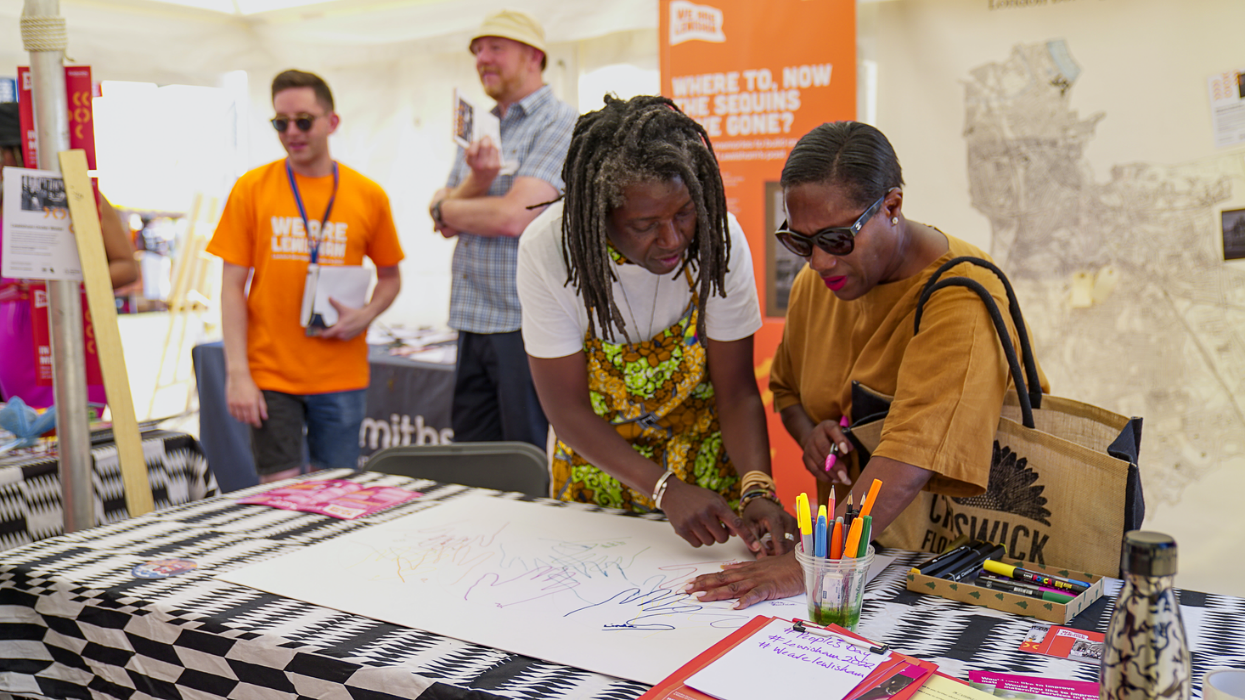
Figure 6 - In Living Memory activities for Lewisham People's Day
Our Civic Catalysts programme (2022) has introduced a new funding pathway to help link Goldsmiths research to local needs and priorities. This scheme supports participatory, two-way research projects that work with communities to help drive change locally. Funded projects in 2022 included ‘Park Life’, an initiative working with local school pupils to empower them as co-researchers into and advocates for their local parks and green spaces.
Engagement activity is supported by external cultural partnerships. In 2022 Lewisham’s Horniman Museum and Gardens (a CUA partner) hosted Hair: untold stories. Co-curated with Goldsmiths’ Anthropology Department, this exhibition attracted 145,760 visitors. At Walthamstow’s William Morris Gallery, Althea McNish: colour is mine (2022), co-curated with Goldsmiths Design, was visited by 56,183 people. The gallery reported a ‘diverse audience share’ increase from 18% to 31%.
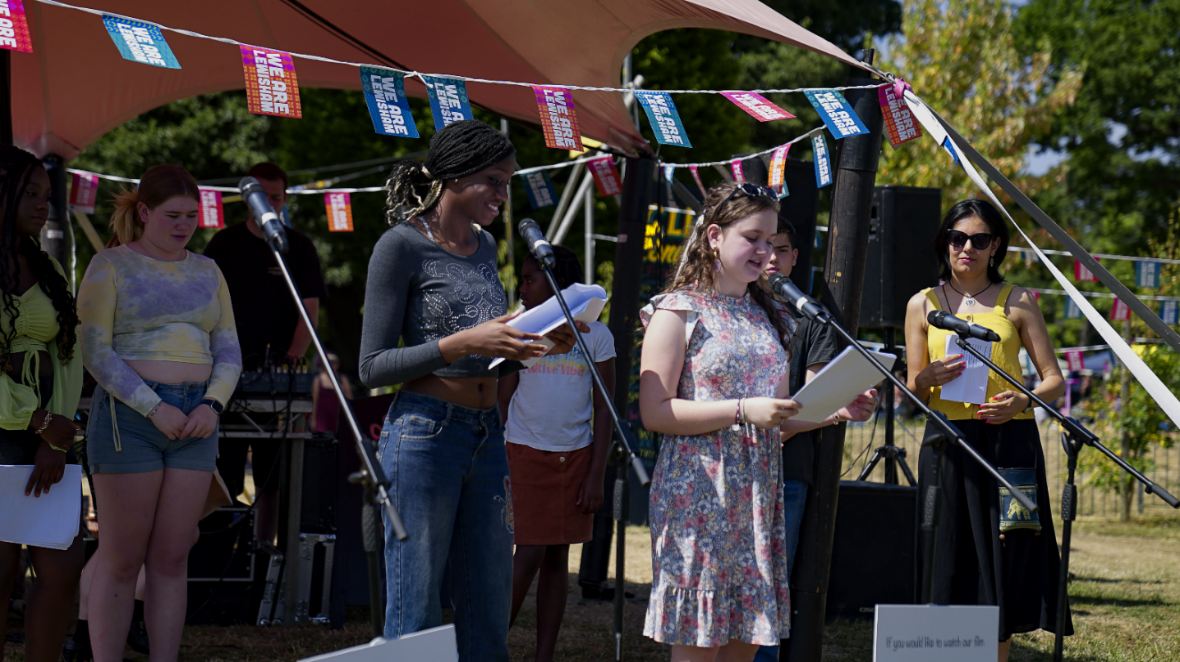
Figure 7 - The Park Life project at Lewisham People's Day.
Aspect 4: Enhancing practice
Evaluation is embedded at a number of levels, both in relation to individual projects and institutionally. Our approach is informed by regular engagement with sessions run by the NCCPE, Civic Universities Network, London Higher and other sector associations.
Initiatives such as our Civic Strategy and Civic University Agreement have accompanying evaluation frameworks. As of 2022 an annual data collection exercise is undertaken across different teams and a Goldsmiths Civic Report is compiled, with our Civic Strategy Group offering a forum for considering findings and updating practice. One strand of our civic work is, in itself, aimed at improving central reporting and evaluation structures for engagement activity across the university. Our annual report provides leverage for this.
Evaluation exercises are also conducted annually against our CUA, measuring progress against agreed objectives. Anonymous surveys are conducted with the 11 partners, offering opportunities for feedback, and an annual report condenses data and offers an opportunity to reflect on progress. We aim to commission an external evaluation of the CUA at the 3-year point (2024). The CUA development process, and that of our Civic Strategy, was also informed by externally commissioned evaluation reports.
All public engagement activities funded by internal grants are evaluated. Plans for evaluation are outlined at application stage and are part of the assessment criteria for awards. Grantees are signposted to evaluation guides and templates. In many cases, evaluation is incorporated into the engagement activity itself.
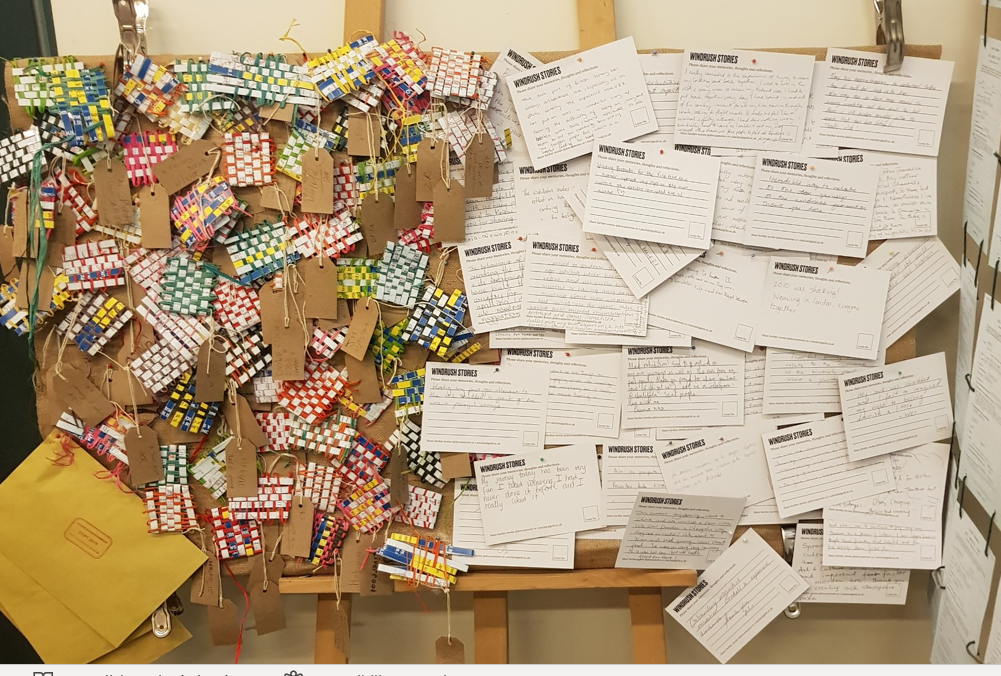
Figure 8 - Windrush: Arrival 1948 exhibition at the V&A.
Goldsmiths researchers benefit from regular training opportunities in evaluation methods, which complement the range of toolkits and resources made available to them. Our staff forums offer opportunities for sharing good practice and our Warden’s Awards for Public Engagement offer a mechanism for rewarding it.
Evaluation expertise is also shared reciprocally with local organisations. Goldsmiths academics have worked with local charities, housing associations and local authorities on evaluation projects. Core costs are underwritten by our Civic Catalysts budget and value flows back into the community in the form of improved public services.
Aspect 5: Building on success
The past three years have been a time of considerable change, both at Goldsmiths and (inter)nationally. Goldsmiths has been impacted significantly by the fallout from the Covid-19 pandemic and we have had to be tactical as well as strategic since 2019. There has been some disruption, and some of our strategic aims, for example to become an NCCPE ‘Gold’ Watermarked institution by 2023, have not been achieved.
This period has, however, also offered important opportunities to reappraise and to refresh our approach. Promoted by societal issues (Black Lives Matter, the Covid-19 pandemic) the ‘local turn’ in much of our engagement work is one result of this. Closer engagement with local and regional development strategies via our CUA, the strategic theming of PER activities to issues that resonate with local communities, the CCA’s Residents programme and our Civic Catalysts engaged research initiative are all examples of a new focus on place.
As outlined in Aspect One, Governance structures for public and community engagement are linked to our three core strategies:
Our Civic Strategy is overseen by a senior-level Civic Strategy Group, chaired by our Pro Warden for Research and Knowledge Exchange.
Our CUA is overseen by our CUA Partners Group, chaired by our Director of Research, Innovation and Knowledge Exchange.
Public Engagement with Research is overseen by a Public Engagement Strategy Group, chaired by the Academic Lead for Public Engagement.
How the public are involved in development/ oversight:
Public consultation exercises have been conducted around key projects such as the development of our CUA (2019-2020), development of our Battle of Lewisham Memorial (2019), and future of our Deptford Town Hall statues (2021). ‘Community Conversations’ are also held, in a town hall format.
In 2023 we will hold our first Community Conference. This will play a central role in evaluating our Borough of Culture activities and shaping our next Public Engagement with Research Strategy.
We are represented at leadership level in the Lewisham Strategic Partnership and at local Ward Assemblies, which provide opportunities for dialogue, engagement and reflection on our approach.
Perhaps the key change in our engagement activity since 2019 has, indeed, been a more strategic and effective approach to working with local partners and communities. The development of our CUA has been key to this, providing a bedrock for closer dialogue with local anchor institutions and alignment with civic priorities. Work in public and community engagement increasingly dovetails with broader ambitions at Goldsmiths around involvement in local growth and regeneration, regional development, and cultural policy. Through engaged practice, evaluation and continuous improvement, we are continuing to develop our mission as a Lewisham anchor institution and ‘truly civic’ university.
Note You are currently viewing the latest version of this narrative statement. View the previous version as published in previous iterations of the KEF (KEF1 and KEF2)